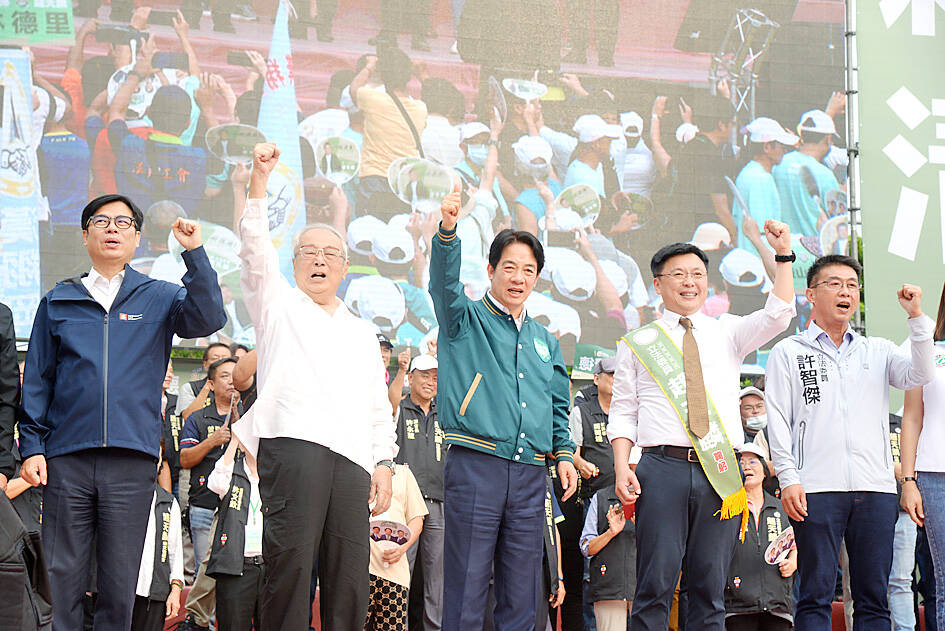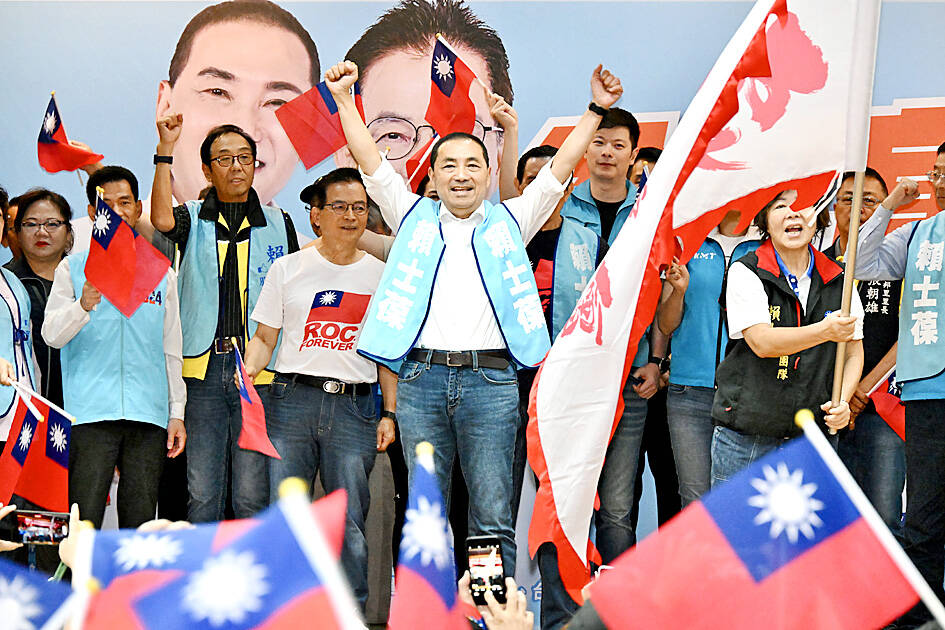Accepting the so-called “1992 consensus” is equivalent to abandoning the sovereignty of Taiwan, Vice President and Democratic Progressive Party (DPP) presidential candidate William Lai (賴清德) said while campaigning in Kaohsiung yesterday.
The “1992 consensus” refers to a tacit understanding between the Chinese Nationalist Party (KMT) and the Chinese Communist Party (CCP) that both sides of the Taiwan Strait acknowledge that there is “one China,” with each side having its own interpretation of what “China” means.
“Sovereignty is like ownership of the property. You can protect the property only if you have the ownership. Without sovereignty, you lose land deeds, property ownership, democracy and human rights,” Lai said.

Photo: Hsu Li-chuan, Taipei Times
“Taiwan is an independent nation, with sovereignty belonging to the 23.5 million people who live there. It does not belong to China or other nations,” he said.
Signing a peace agreement with China, as some people have proposed, would not achieve real peace, Lai said.
“If a peace agreement works, Tibet would be a different place. Opposition parties proposed that we accept the ‘1992 consensus,’ which maintains the ‘one China’ principle and would lead to ‘one country, two systems.’ Accepting the ‘1992 consensus’ means giving up Taiwan’s sovereignty and losing freedom and democracy,” Lai said.

Photo: George Tsorng, Taipei Times
The problem in the Taiwan Strait is not a continuation of the Chinese Civil War, nor is it merely a problem between Taiwan and China, Lai said.
“This is a problem that the world has to deal with. We need to jointly protect Taiwan by forming alliances with other democratic countries,” he said. “We must not be afraid because China is intensifying its threat against Taiwan.
The government would be willing to talk to China if Beijing treats Taiwan with respect and dignity, he added.
Separately yesterday, New Taipei City Mayor and KMT presidential candidate Hou You-yi (侯友宜) told supporters that January’s presidential election is “a choice between peace and war” and pledged to keep the Taiwan Strait peaceful and safe.
Russia’s invasion of Ukraine has made the world worry that a war could break out in the Taiwan Strait, Hou said, adding that the US’ support of Taiwan shows the international community is concerned about the safety of Taiwan.
The DPP would push Taiwan to the brink of a war once it is elected to govern the country again, Hou said, adding that he would investigate all the scandals that happened under the DPP government once he is elected president.

The Ministry of Economic Affairs has fined Taobao NT$1.2 million (US$36,912) for advertisements that exceed its approved business scope, requiring the Chinese e-commerce platform to make corrections in the first half of this year or its license may be revoked. Lawmakers have called for stricter enforcement of Chinese e-commerce platforms and measures to prevent China from laundering its goods through Taiwan in response to US President Donald Trump’s heavy tariffs on China. The Legislative Yuan’s Finance Committee met today to discuss policies to prevent China from dumping goods in Taiwan, inviting government agencies to report. Democratic Progressive Party Legislator Kuo Kuo-wen (郭國文) said

The Ministry of Economic Affairs has fined Taobao NT$1.2 million (US$36,900) for advertisements that exceeded its approved business scope and ordered the Chinese e-commerce platform to make corrections in the first half of this year or its license would be revoked. Lawmakers have called for stricter supervision of Chinese e-commerce platforms and more stringent measures to prevent China from laundering its goods through Taiwan as US President Donald Trump’s administration cracks down on origin laundering. The legislature’s Finance Committee yesterday met to discuss policies to prevent China from dumping goods in Taiwan, inviting government agencies to report on the matter. Democratic Progressive Party

Taiwan and its Pacific ally Tuvalu on Tuesday signed two accords aimed at facilitating bilateral cooperation on labor affairs, according to Taiwan’s Ministry of Foreign Affairs (MOFA). The governments inked two agreements in Taipei, witnessed by Foreign Minister Lin Chia-lung (林佳龍) and visiting Deputy Tuvaluan Prime Minister Panapasi Nelesone, MOFA said in a news release. According to MOFA, the agreements will facilitate cooperation on labor issues and allow the two sides to mutually recognize seafarers’ certificates and related training. Taiwan would also continue to collaborate with Tuvalu across various fields to promote economic prosperity as well as the well-being of their

Sung Chien-liang (宋建樑), who led efforts to recall Democratic Progressive Party (DPP) Legislator Lee Kun-cheng (李坤城), was released on bail of NT$80,000 today amid outcry over his decision to wear a Nazi armband to questioning the night before. Sung arrived at the New Taipei District Prosecutors’ Office for questioning in a recall petition forgery case last night wearing a red armband bearing a swastika, carrying a copy of Adolf Hitler’s Mein Kampf and giving a Nazi salute. Sung left the building at 1:15am without the armband and covering the book with his coat. Lee said today that this is a serious